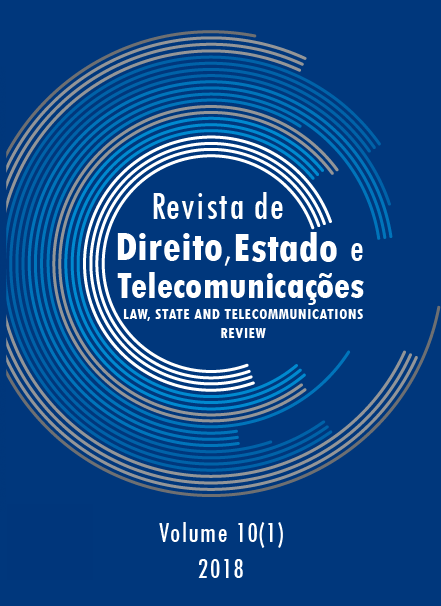Entre tecnodeterminismo e interesse público: limites e possibilidades de regulação da internet
DOI:
https://doi.org/10.26512/lstr.v10i1.21503Palavras-chave:
Internet. Regulação. Excepcionalismo. Interesse público.Resumo
Propósito ”“ O presente artigo tratará da regulação da internet, apresentando as controvérsias existentes entre os que defendem o seu caráter excepcional e os que defendem a necessidade de maior controle e tutela de direitos. O tema será tratado a partir de uma visão ampla e descentrada de regulação e da compreensão da tecnologia como algo incrustado nas relações sociais, o que permite sustentar a possibilidade de regulação, que deve ser feita a partir da perspectiva da teoria regulatória centrada no interesse público de Tony Prosser, que mescla elementos substantivos e procedimentais.
Metodologia/abordagem/design ”“ O artigo parte da busca por conceitos operacionais de regulação e governança da internet, analisando as consequências da adoção de uma concepção mais ampla e descentrada de regulação. Em seguida são apresentadas as teses libertárias e paternalistas da regulação da internet, que fundamentam os debates acerca da regulabilidade e da excepcionalidade da rede para, com apoio nas teses de regulação da Internet de Lawrence Lessig e Andrew Murray, analisar o paradigma tecnodeterminista.
Resultados ”“ A partir das abordagens utilizadas, é possível estabelecer parâmetros mínimos para que a regulação da internet seja feita em uma perspectiva da tutela do interesse público.
Referências
BAPTISTA ,Patrícia; KELLER, Clara Iglesias. Por que, quando e como regular as novas tecnologias? Os desafios trazidos pelas inovações disruptivas. RDA ”“revista de Direito Administrativo, Rio de Janeiro, v. 273, p. 123-163, set./dez. 2016.
BLACK, Julia. Critical Reflections on Regulation, LSE Centre for the Analysis of Risk and Regulation Discussion Paper 4, 2002. Disponível em: http://www.lse.ac.uk/accounting/CARR/pdf/DPs/Disspaper4.pdf.
DUBASH, Navroz K. e MORGAN, Bronwen. The rise of the regulatory state of the south. Oxford: Oxford University Press, 2013.
FRYDMAN, B., HENNEBEL., L. LEWKOWICZ, G., Public strategies for internet Co-Regulation in the United States, Europe and China. In BROUSSEAU, E., MARZOUKI, M., e MËADEL, C. Governance, Regulations and Powers on the the Internet. Cambridge: Cambridge University Press, 2008. Disponível em: http://ssrn.com/abstract=1282826.
GOLDMAN, Eric. The Third Wave of Internet Exceptionalism. In SZOKA, Berin e The next digital decade -Essays on the future of the internet. Washington: TechFreedom, 2010. Disponível em: https://www.nyu.edu/projects/nissenbaum/papers/The-Next-Digital-Decade-Essays-on-the-Future-of-the-Internet.pdf.
GONÇALVES, Alcindo. O CONCEITO DE GOVERNANÇA. Anais do XIV Congresso do Conpedi. 2006.Disponível em http://www.publicadireito.com.br/conpedi/manaus/arquivos/anais/XIVCongresso/078.pdf.
MAJONE, Giandomenico. The transformation of the regulatory State. Osservatorio sull’Analisi de Impatto della regolazione. 2010. Disponível em: www.osservatorioair.it.
MARCUS, Adam. The next digital decade -Essays on the future of the internet. Washington: TechFreedom, 2010. Disponível em https://www.nyu.edu/projects/nissenbaum/papers/The-Next-Digital-Decade-Essays-on-the-Future-of-the-Internet.pdf.
MARSDEN, Christopher. Regulating the global internetsociety. Londres: Routledge, 2000.
______. Internet Co-Regulation: European Law, Regulatory Governance and Legitimacyin Cyberspace. Cambridge: Cambridge University Press, 2011a.
______. Internet Co-regulation and constitucionalism: towards a more nuancedview, 2011b. Disponível em SSRN: https://ssrn.com/abstract=1973328MUELLER, Milton. Networks and States. The global politics of internet governance. 2010.
MURRAY, Andrew. Nodes and gravity in virtual space. 5 Legisprudence 195, 2011.
POST, David e JOHNSON, David. Law and Borders”“The Rise of Law in Cyberspace, Stanford Law Review, nº 48, 1996. Disponível em http://journals.uic.edu/ojs/index.php/fm/article/view/468/824PROSSER, Tony. Theorising Utility Regulation. Heinonline, 62 Mod. L. Rev. 196. 1999.
______. Two visions of regulation.Paper by Tony Prosser for ‘Regulation in the Age of Crisis’, University College. Dublin, 2010. Disponível em http://regulation.upf.edu/dublin-10-papers/1H1.pdf.
SASSEN, Saskia. Towards a Sociology of Information Technology-Current Sociology, Maio de 2002, Vol. 50(3): 365”“388 disponível em http://www.saskiasassen.com/PDFs/publications/Towards-a-Sociology-of-Information-Technology.pdf.
______. Losing Control?: Sovereignty in an Age of Globalization.Disponível em: https://www.researchgate.net/publication/30529999.
VAN EETEN Michel e MUELLER, Milton. Where is the governance in Internet governance? New Media & Society, 2012. Disponível em: https://www.researchgate.net/deref/http%3A%2F%2Fnms.sagepub.com%2Fcontent%2Fearly%2F2012%2F11%2F19%2F1461444812462850.
WEBSTER, Frank. Theories of information society, 4ª. Ed. Londres: Routledge, 2014.
WIENER, Jonathan B., The regulation of technology, and the technology of regulation. Technology in Society nº 26, 2004. p. 483”“500. Disponível em http://scholarship.law.duke.edu/cgi/viewcontent.cgi?article=1960&context=faculty_scholarship.
WILSON III, Ernest J. The information revolution and developing countries. Cambridge: The MIT Press, 2004.WU, Tim. Is Internet Exceptionalism Dead? . In SZOKA, Berin e MARCUS, Adam. The next digital decade -Essays onthe future of the internet. Washington: TechFreedom, 2010. Disponível em: https://www.nyu.edu/projects/nissenbaum/papers/The-Next-Digital-Decade-Essays-on-the-Future-of-the-Internet.pdf.
ZITTRAIN, Jonathan. The future of the internet and how to stop it. Yale University Press & Penguin UK, 2008. Disponível em http://nrs.harvard.edu/urn-3:HUL.InstRepos:4455262.
Downloads
Publicado
Edição
Secção
Licença
By submitting this paper to the Law, State and Telecommunications Review,
I hereby declare that I agree to the terms of the Creative Commons Attribution 4.0 International (CC BY 4.0).


